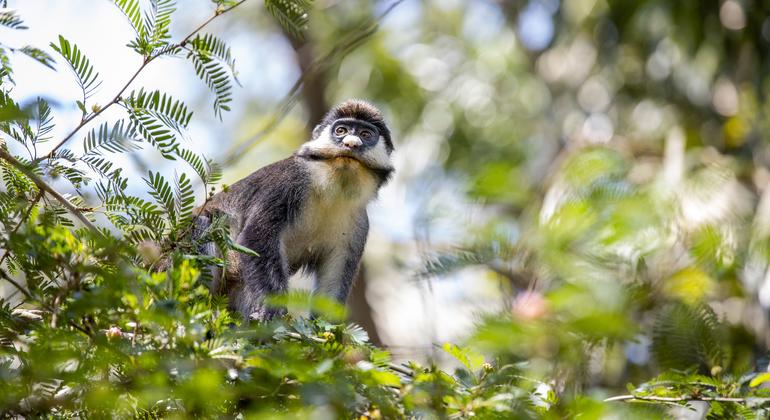“The two need to be looked at as being on the same wavelength, and not one higher than the other,” Elizabeth Mrema, Executive Secretary of the UN Convention on Biological Diversity (CBD), the international legal instrument to protect biodiversity ratified by 196 nations, told UN News.
‘Biodiversity Day’ at COP27 in Sharm el-Sheikh comes just two weeks ahead of a high-level gathering of CBD States Parties in Montreal, aimed at reversing biodiversity loss.
Four of the key architects of the Paris Agreement, including former UN climate change chief Christiana Figueres, have officially asked world leaders to deliver an ‘ambitious and transformative’ global biodiversity agreement in the upcoming COP15 on biodiversity.
“The climate and nature agendas are entwined…Only by taking urgent action to halt and reverse the loss of nature this decade, while continuing to step up efforts to rapidly decarbonize our economies, can we hope to achieve the promise of the Paris Agreement,” they said in a statement.

Parrots
The connection, explained
The UN Environment Programme (UNEP) explains that the loss of biodiversity is already significantly affecting regional and global changes in climate.
While natural ecosystems play an important role in regulating climate and can help to sequester and store carbon, the loss of forests, the draining of wetlands and other environmental degradation has contributed significantly to climate change.
According to the agency, efforts to reduce deforestation and forest degradation and restore ecosystems, for example, could contribute to lowering annual greenhouse gas emissions.
“If we invest in nature and natures infrastructure, forests, coral reefs, mangroves, coastal forests, well, it protects us from high storms. It provides habitat for species, but it also stores carbon. So, it has both a mitigation and an adaptation dimension,” Inger Andersen, UNEP Executive Director, told UN News.
Coral reefs get a new defender at COP27
At the same time, biodiversity is affected by extreme weather events and temperatures, especially in developing countries, due to limited resources to protect them. This is worrying, since 15 of the 17 countries with the largest biodiversity are in the global South.
The effects of climate change on biodiversity are already visible, especially with many animal species already forced to change migration patterns, plants struggling to adapt to changes in temperature, and of course seriously vulnerable polar bears – the ‘poster animals’ of global warming – starving at the North Pole due to the lack of sea ice in a warming world.

In the ocean, biologists are witnessing another tragedy as coral reefs, which provide food and shelter for over 7,000 other species, are dying because of the warming and acidification of the ocean.
UNEP Goodwill Ambassador, Ellie Goulding launched a new initiative at COP27 aimed to protect these colonial animals.
Last week, she led an expedition in the Red Sea, off the coast of Sharm el-Sheikh.
“There’s this sheer visual beauty. When you pass through with your mask and witness this brilliant cornucopia of marine life, you feel as if all life is swimming in front of your eyes. And it reminded me that coral covers just a tiny percentage of the sea floor, but it supports a quarter of all known marine species,” she told a panel on Wednesday.
Ms. Goulding reminded participants that even at 1.5C degrees of warming, 70 to 90 pe cent of all reefs will be lost; this number jumps to a worrying 99 per cent if our planet warms by 2.0 degrees C.
“This is one of the most climate tolerant reefs in the world, and it just happens to be right here at your feet in Sharm el-Sheikh. And this is no ordinary reef. It’s one of nature’s great survivors and it could be the key to regenerating other reefs in the future,” she explained.
The singer-songwriter said it was “insulting” that less than 0.01 per cent of climate finance is devoted to protecting coral reefs.
“I ask the global community of leaders to acknowledge that coral reefs are one of our greatest collective assets and to get seriously, seriously ambitious and competitive about funding, restoration and protection,” she said.

Amarakaeri Communal Reserve (RCA) is a natural protected area of 402,335.96 hectares managed by 10 harakbuts, yines and machiguengas communities in Madre de Dios, in the Peruvian Amazon.
Forests, the Amazon and promises
Important pledges aimed at protecting forests were made last year at COP26 in Glasgow.
“Some of them are beginning to roll off the belt onto reality. But there’s a reason why Egypt framed this as the ‘implementation COP’; because those pledges and promises have to see real action,” stated UNEP chief Andersen.
Last week, the European Union also announced a new cooperation framework on reversing deforestation in Guyana, Mongolia, the Republic of Congo, Uganda and Zambia.
On Wednesday, Luiz Inácio Lula da Silva, President-Elect of Brazil, drew a huge crowd at the pavilions and a meeting room in the afternoon as he stressed that his country would put up a very strong fight against illegal deforestation in the Amazon. He also announced that Brazil aims to host COP30 in 2025.
Mr. Lula da Silva also announced the creation of an indigenous ministry in his new administration.
“He will place a major emphasis on the Amazon and on tropical forests. And that is, of course, a massive gain for climate, for biodiversity and for the people of the Amazon,” Ms. Andersen said, reacting to the Brazilian leader’s announcements.
The Egyptian COP27 Presidency also announced today a series of initiatives related to protecting biodiversity.

Indigenous activists protest at COP27.
‘We need action now’
Indigenous activists, who have made a strong showing since the start of COP27, were especially vocal today, as they are the guardians of our planet’s biodiversity.
“My community was hit by two cyclones in just one year and our [entire] city was completely destroyed. We don’t want to live like this anymore. We need a safe space; we need a safe planet,” Adriana da Silva Maffioletti, a young activist from Brazil told UN News.
She added that she hoped world leaders would listen to the indigenous leadership instead of exploiting them.
“Indigenous people have the most sustainable way to live. So, we must learn from them and not put them aside in this fight. We protect over 80 per cent of the planet’s biodiversity,” she explained.
Ms. Da Silva Maffioletti underscored that her people – their voices, experience and ideas – should be the number one priority in the fight against climate change.
“This is not something for tomorrow. This is not something for 10 years [from now]. This is something for us to do right now. The climate crisis is affecting and killing people right now. So, we must act now,” she declared.
“We are not going to give up on this fight. Extractive companies, and even some wind energy projects that wear ae not being consulted [on] are affecting Mother Earth, our sources, our medicine,” Yenilin Aurielen Lubo Bonivento, from the Guayu community in Colombia, also told UN News.
She comes from the Guajira department in the north of the South American nation, an area among the most affected by climate change.
She is also a biologist and is currently teaching young girls in her community about science.
“We need to raise our voices, and [draw on the] science, combined with our ancestral knowledge. This is the key to fighting climate change.”

The COP27 venue, Sharm El-Sheikh, Egypt
Updates on negotiations
Regarding negotiations, the Egyptian COP27 Presidency reported on Wednesday that unfortunately, many delegations are “holding back” a number of negotiation rooms.
“We would have hoped under the current circumstances to see more willingness to cooperate and accommodate than we are seeing in the reports that we receive from the various negotiating tracks. I [will] reserve the verdict: perhaps some countries and delegations will show more openness and accommodation as the last minute comes,” Ambassador Wael Aboulgmagd, Special Representative for the COP27 President, told journalists.
He added that, when negotiators were adopting the agenda, which includes for the first time a ‘loss and damage’ item, they only had “a breakthrough” at the last hour.
UN News spoke with Ruanna Hayes, negotiator from the Alliance of Small Island States (AOSIS), who confirmed that the discussions are not especially hopeful at the moment.
“There’s real concern about how things are progressing across the board. Of course, loss and damage is a key issue, the key outcome that the Alliance is looking for from this COP, and things are still not coming together,” she said.
Special Representative Aboulgmagd sent a message to negotiators, reminding them that although every delegation must consider its national interests, the situation [of climate change] is dire, as the science reports show.
“I hope delegations in the negotiation rooms take this to heart and realize that they need to show progress, not in words but in action and implementation,” he said.
Want to know more? Check out our special events page, where you can find all our coverage of the COP27 climate summit, including stories and videos, explainers, podcasts and our daily newsletter.



